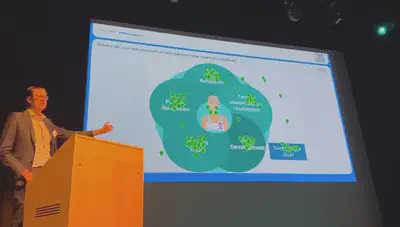The launch event schedule is important as it will signal to everyone what the centre prioritises. Consider whether you want a half-day for a smaller centre or a full-day for a large centre. Create a draft agenda that breaks up the day into talk slots and begin to fill those slots with key speakers.
Plan large breaks
Make sure your schedule has large breaks. An hour or more for lunch, and 45 minutes or more for breaks in the morning and afternoon is ideal. The magic really happens in the breaks. The talks get people thinking but then the conversations that happen over coffee are where new collaborations form. This also gives you the potential for the schedule to run over a little without too much trouble. At least in the first drafts of the schedule keep the breaks very long, you might find as the launch approaches that you need to squeeze in another speaker and you’ll be grateful you did.
Think carefully about who you are inviting to speak
Think about differentiating your launch event from standard academic/research events by inviting people to speak that align with the identity of your centre. The Sussex Cancer Research Centre’s identity is “patient-centric cancer research”. Therefore, we needed to invite cancer patients to talk at our launch. If your centre intends to unite business and charities then put representatives from those organisations on stage. Similarly think about order and combinations of speakers. If your centre uniquely brings together clinicians and researchers, or engineers and chemists, then arrange speaker slots such that this is highlighted with back-to-back talks.
Many short talks are better than a few long ones. At the launch of a centre you want to highlight the diversity and quality of research taking place. Getting into the detail of methods and results doesn’t bring as much value. Try and balance highlighting all the key players with having an agenda that is not too frantic, too incoherent, or with too many changeovers.
The most valuable speakers are selfless speakers. As you’ve had discussions about the centre with lots of people by this point, think back to those discussions and who was truly supportive of the centre’s goals. The best speakers for a launch will combine their research/innovation success story with the mission of the centre. Look out for these people and invite them to talk.
Plan some interactivity
One key goal of a centre’s launch is to identify how your new centre can achieve its goals. If your centre is designed to facilitate collaborations then the launch is a unique opportunity to understand the barriers and opportunities to achieve this. If your centre is designed to improve training of students and early career researchers in your area, then the launch is a fantastic opportunity to understand what their training needs might be. There are many tools to perform interactive sessions in which participants can engage with their phones. Think beyond the default of voting for answers and ensure there is lots of potential to get plain text feedback that might be outside your expectations. We chose PollEverywhere due to some unique features that let users click to identify themselves in our research roadmap. These dots appeared in real time and were very effective at highlighting that we’d brought the right people together!

Our agenda included two interactive sessions, which we broadly set up as “problem identification session” and “solution proposal session”. We identified the major barriers to our vision in the first session and in the latter session allowed the audience to suggest how we could help overcome those challenges. Our co-director had the idea to name the second session “Our Cancer Centre” or “Your Cancer Centre” to enable the audience providing feedback to feel ownership of the new endeavour we were embarking on together.
Below I provide our agenda’s outline to help get you started. Because we were bringing together so many institutions we had many 5-minute slots at the start, which we used to get our institutional leaders to endorse us. If you can avoid these then do, as these felt rushed on the day. The rest of the agenda worked really well and we received overwhelmingly positive feedback on the day.
